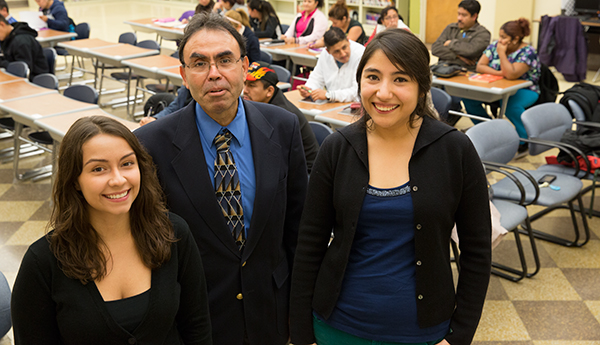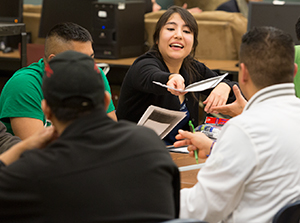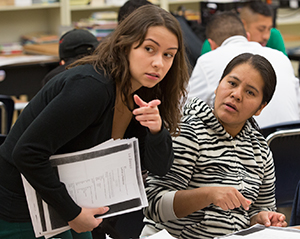
The students come quietly, walking on a cold night from home or jobs, eagerly knocking on the locked door.
Behind that door is a school library and a brighter hope for the future for these adults who are determined to learn the English language.
This free English-as-a-Second-Language (ESL) pilot program, which started in fall 2013, is a partnership between the University of Wisconsin-Milwaukee School of Education and St. Anthony’s School on Milwaukee’s South Side. Two UWM education students teach the classes to 20 adults twice a week.

“We had discussed the work Dr. [Javier] Tapia is doing with the community in class,” says teacher Marleisa Quiles, a senior in Educational Policy and Community Studies (EPCS). “We saw how this work was able to make a difference, and I was excited to be part of it.”
The class for parents and other adults in the community grew out collaborations Tapia, associate professor in EPCS, had developed with St. Anthony’s, the largest Hispanic Catholic high school in the U.S. In working with the school, he found many of the students’ parents wanted to improve their English. However, between working and raising families, they often couldn’t find the time or the money to take formal classes.
A grant from Hispanics for School Choice made it possible to provide a small stipend for the two teachers as well as supplies for the class, says Tapia.
The parents face challenges beyond finding time and money to take classes.
“Many of the adults haven’t had to learn English, because Milwaukee is so segregated that they’re not exposed to English and could get along well interacting with just the Latino community,” says Quiles, who is majoring in Community Education and Engagement.

In addition, says Lillian Lara, the other teacher for the class, “the reception outside the community isn’t always welcoming to immigrants, so they don’t try to speak English.” Lara is in the second year of the Cultural Foundations of Education master’s degree program.
Quiles grew up not far from St. Anthony’s in a Latino home. Lara, who is from Houston, grew up in a Spanish-speaking home. Both are fluent in English and Spanish. “We’re from the community and they feel comfortable with us,” says Lara. One student told them she had been trying for 10 years to learn English, and having the evening program right in the community encouraged her to try again.
The students are motivated to learn for a number of reasons, say Tapia and the teachers.
With immigration reform under discussion, many in the community believe that knowledge of English will be helpful in applying for legal status, says Tapia.
Helping their children with homework is another reason many parents give for wanting to learn English. And, for others, learning English can help them find better jobs or move up in their current careers, says Tapia.
For the UWM students, working in the community allows them to practice what they’ve been learning in the classroom. “It gives them an opportunity to use some of their knowledge and skills from their classes in a practical application,” says Tapia.
The students agree. “It’s a chance to expand on what we’re learning in the classroom,” says Quiles.
For both, it’s also an opportunity to serve. “Both of them are hardworking and committed to giving back to the community,” says Tapia.






